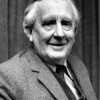Yet it is told among the Eldar that the Valar endeavoured ever, in despite of Melkor, to rule the Earth and to prepare it for the coming of the Firstborn; and they built lands and Melkor destroyed them; valleys they delved and Melkor raised them up; mountains they carved and Melkor threw them down; seas they hollowed and Melkor spilled them; and naught might have peace or come to lasting growth, for as surely as the Valar began a labour so would Melkor undo it or corrupt it. And yet their labour was not all in vain; and though nowhere and in no work was their will and purpose wholly fulfilled, and all things were in hue and shape other than the Valar had at first intended, slowly nonetheless the Earth was fashioned and made firm. And thus was the habitation of the Children of Ilúvatar established at the last in the Deeps of Time and amidst the innumerable stars.
John Ronald Reuel Tolkien (3 January 1892 – 2 September 1973) was an English writer, poet, philologist, and academic, who is best known as the author of the classic high fantasy works The Hobbit, The Lord of the Rings, and The Silmarillion.
He served as the Rawlinson and Bosworth Professor of Anglo-Saxon and Fellow of Pembroke College, Oxford, from 1925 to 1945 and Merton Professor of English Language and Literature and Fellow of Merton College, Oxford, from 1945 to 1959. He was at one time a close friend of C. S. Lewis—they were both members of the informal literary discussion group known as the Inklings. Tolkien was appointed a Commander of the Order of the British Empire by Queen Elizabeth II on 28 March 1972.
After Tolkien's death, his son Christopher published a series of works based on his father's extensive notes and unpublished manuscripts, including The Silmarillion. These, together with The Hobbit and The Lord of the Rings, form a connected body of tales, poems, fictional histories, invented languages, and literary essays about a fantasy world called Arda and Middle-earth within it. Between 1951 and 1955, Tolkien applied the term legendarium to the larger part of these writings.While many other authors had published works of fantasy before Tolkien, the great success of The Hobbit and The Lord of the Rings led directly to a popular resurgence of the genre. This has caused Tolkien to be popularly identified as the "father" of modern fantasy literature—or, more precisely, of high fantasy. In 2008, The Times ranked him sixth on a list of "The 50 greatest British writers since 1945". Forbes ranked him the fifth top-earning "dead celebrity" in 2009.

